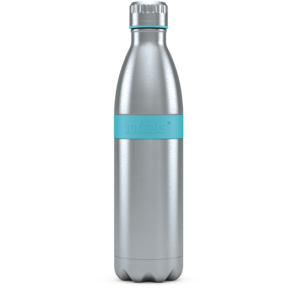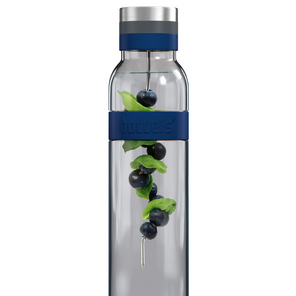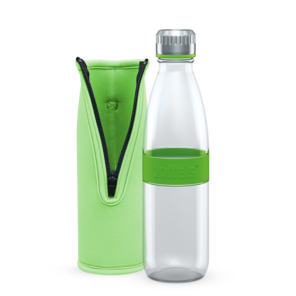![[Translate to Englisch:]](/fileadmin/_processed_/b/4/csm_zitrusfru__chte_vitamine_b792a17e32.png)
The word "vitamin" is a composition of the Latin words "vita" (life) and "amine", which means "nitrogenous basic compound". Vitamins support us in obtaining energy from food, eliminate dangerous free radicals and help us with the formation of blood cells, hormones and enzymes. There are water-soluble and fat-soluble vitamins. The difference lies in the type of absorption and the duration of storage in the body.
Vitamin A for healthy cells and tissue
The first vitamin in our vitamin alphabet is vitamin A. It is a fat-soluble vitamin that is usually only absorbed through animal products. However, vegetarians or vegans do not need to worry: Beta-Carotene, a precursor of the Vitamin A, can be found in many kinds of vegetable such as carrots, spinach or corn. Beta-Carotene is turned into Vitamin A during digestion.
Vitamin A is responsible for the new formation and development of cells and human tissue, like for example the skin. It also plays a major role in the development of vision, especially in distinguishing between light and dark.
Vitamin A also helps the body eliminate free radicals, which can have harmful effects on the body.
Vitamin B for more energy and concentration
Within the B-vitamins, there is a whole family. Eight B-Vitamins in total (B1, B2, B3, B5, B6, B7, B9, B12) take care of numerous metabolic functions in our bodies. Vitamin B cannot be produced by the body itself, so it must be completely assimilated through food. Since all family members work closely together, it is important that we are sufficiently supplied with all eight B-vitamins.
Some of the B-vitamins (B1, B2, B3 and B5) are responsible for energy production and metabolism in the body. Other B-vitamins, such as B9 (also called folic acid) or B12 are responsible, among other things, for cell division and blood formation.
The best sources of vitamin B are animal products such as meat, fish or eggs and dairy products, as well as plant-based foods like legumes, whole grain and cereal products. Only the vitamin B12 is rarely found in plant-based food and must be takes as a supplement if you're eating vegan.
Vitamin C for a strong immune system and a good metabolism
Vitamin C, also known as ascorbic acid, is known for its antioxidant properties and is particularly important for the immune system. It fights free radicals and helps the body in numerous metabolic processes, for example when it rebuilds connective human tissue or forms hormones and neurotransmitters. The most important sources of vitamin C include citrus fruits, berries and other fruits such as kiwis. Some vegetables such as bell peppers or potatoes also contain vitamin C.
Vitamin D for strong teeth, bones and muscles
Our body needs vitamin D primarily to absorb calcium from food and thus strengthen bones and teeth.
Vitamin D is reffered to as "the sun vitamin": 80%-90% of the required amount can be produced and even stored by the body itself when exposed to the sun. The process of the transformation of the UV-B rays into vitamin D takes place in the skin - the storage however in the muscle- and fat tissue. The body resorts to it in case of vitamin D deficiency, e.g. during the winter.
Vitamin D can only be absorbed in very small quantities through food. Food containing vitamin D includes fish, some types of cheese and milk, poultry, eggs and fats such as butter or oil.
Vitamin E protects the cells
Vitamin E is a group of compounds called tocopherols. They have a strong antioxidant effect, protect the cells and have an anti-inflammatory effect in the body.
The E-vitamins are produced exclusively by plants and some bacteria. Since they're fat-soluble, the body can only absorb them in combination with fats. The most important sources of vitamin E are cold-pressed vegetable oils, such as olive oil, sunflower oil or coconut oil. In addition, vitamin E is found in nuts, fish and vegetables such as asparagus, broccoli or Brussels sprouts.
Vitamin K for healthy blood
Surprisingly, the last vitamin in our alphabet is K. This is because when vitamins were discovered in 1920, they were numbered from A to K. However, some supposed vitamins had to be striken over time.
Vitamin K has a very important function in the body: blood clotting. Without vitamin K, the formation of coagulation factors is not possible and the body cannot stop unwanted bleeding. Vitamin K ist mostly found in plants such as leafy, green vegetables, kale, broccoli as well as herbs like chives and parsley.
Vitamins are very important for our body, our health and our well-being. Fortunately, a sufficient vitamin intake is not something to be particularly cautious about, since we already get most of our vitamins through food. However, if want to learn more about vitamin-friendly food preparation and get futher tips on the topic, read our blogpost „vitamin stock-up“!
- Share this post


